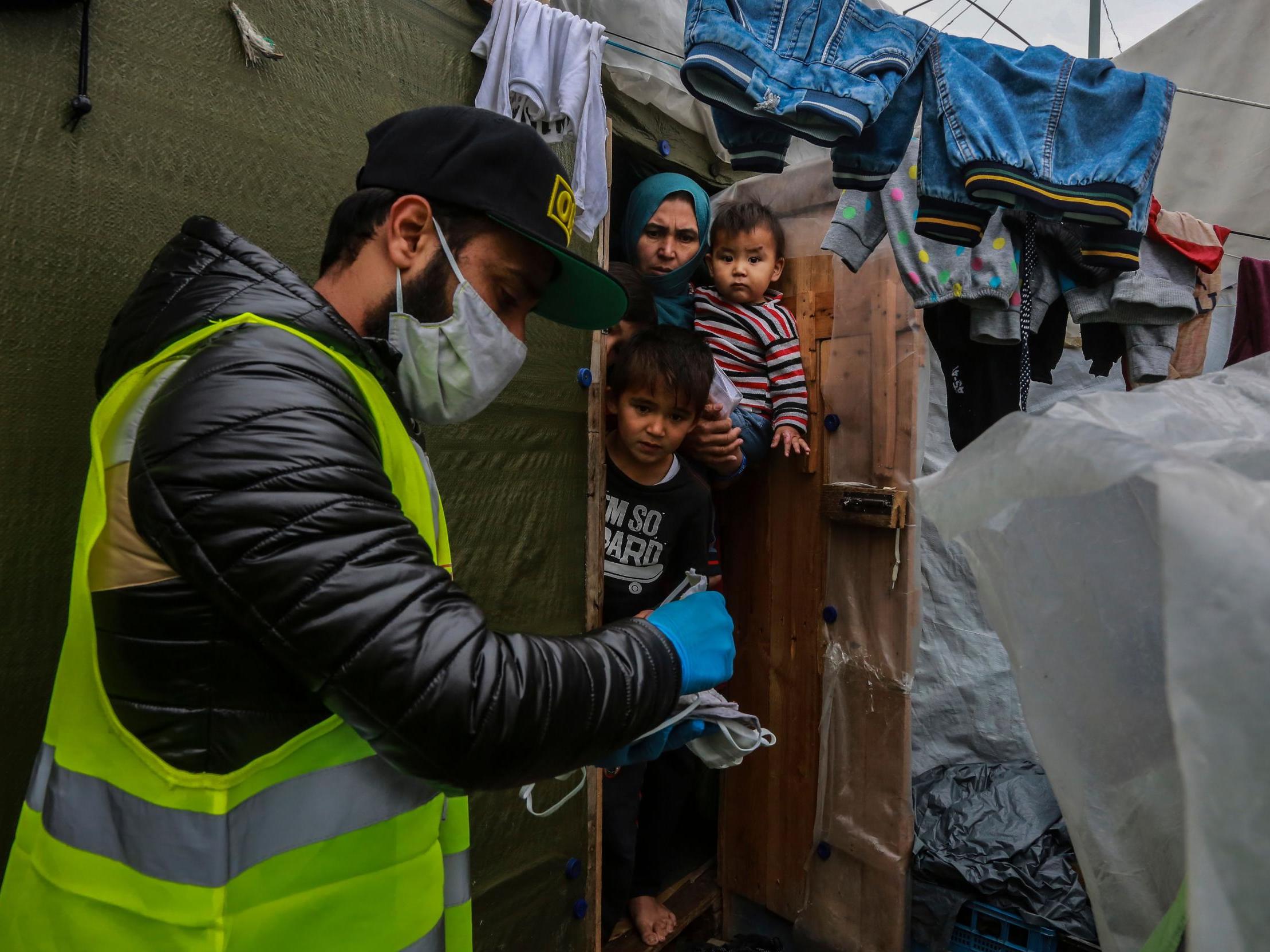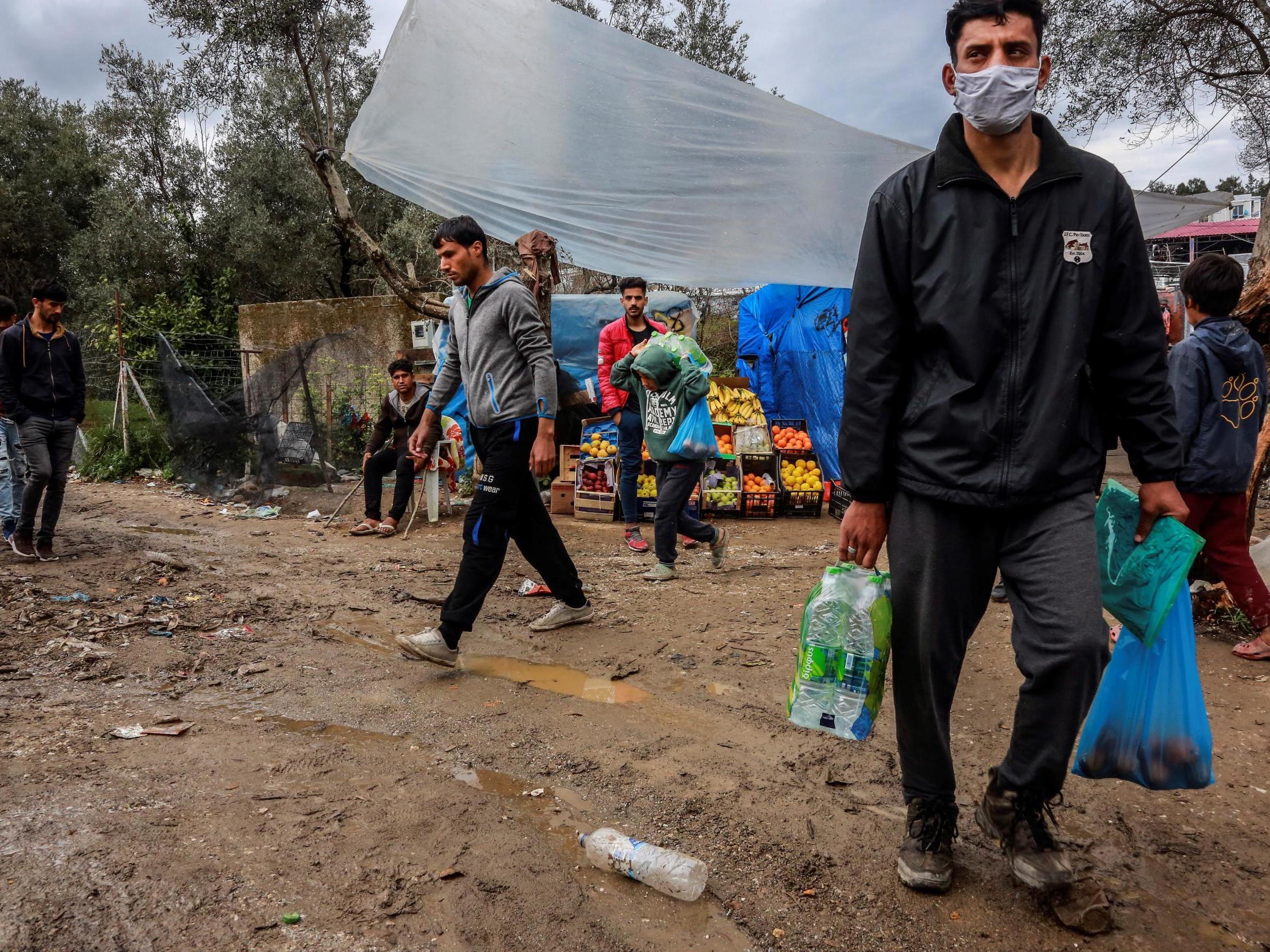‘It’s going to be a death sentence’: Refugee camps and the coronavirus catastrophe waiting to happen
Special report: After years of adversity and suffering, with months spent on the road and at sea, the coronavirus outbreak has brought new uncertainty and danger into the lives of refugees

“We teach the people that you should wash your hands a lot – but most of the time we don’t have water,” says Hasan*, a 24-year-old migrant from Afghanistan. For the past eight months, he’s been living in the infamous Greek refugee camp of Moria, a sprawling cluster of humanity clinging on for life at the edge of Europe.
Along with 20,000 others – cramped together in tents made out of wood and tarpaulin, deprived of basic sanitation in a holding centre that was originally designed for 3,000 – Hasan has been watching with mounting fear as Covid-19 has silently swept across borders, cities and countries.
“They cannot stop coronavirus coming, it’s got everywhere,” he says from inside the settlement.
“If one person with coronavirus comes into the camp – I promise that all of the people in the camp will get it. Every person that’s older than 50 is going to die, unfortunately, and every person with heart and lung disease is going to die.”
Two weeks ago, the Ritsona refugee camp near Athens confirmed 20 cases of coronavirus – all of which were asymptomatic. The settlement, with its population of 2,300 people, has been placed into quarantine, with movement restricted and monitored by police. Authorities are racing to contain the spread but, given the elusive nature of the virus, it could be too late.
For Moria, located on the eastern coast of Lesbos, it feels like only a matter of time. Conditions in the camp are squalid and ripe for the rapid transmission of coronavirus: multiple families share a ragged tent between them, water is hard to access – in some corners of Moria, there are 1,300 people using one tap – and healthcare facilities are severely limited. Many residents are also suffering from underlying health issues or are simply malnourished and frail. The camp is a tinderbox waiting for a single spark. “It’s a nervous atmosphere,” says Hasan.
“In here, we cannot behave like you guys in your country. You’re staying at home, washing yourself, you don’t go to the crowded places – we have to go to the food line, we have to stay in the line for a shower.”
Humanitarian agencies in Moria have begun taking what preventative measures they can, amid concerns the pathogen is most likely to spread from aid workers to refugees now that Greece’s borders have been closed.
Mie Merkelsen, a nurse with Médecins Sans Frontières, says her clinic for pregnant women and sexual abuse victims has divided its services across the camp: febrile patients are treated in one facility, while those without symptoms are sent to a second health centre. Medical staff, meanwhile, are screened for signs of the disease, but without any testing kits it’s impossible to identify potential spreaders – among either workers or refugees.
“We’re doing what we can,” says Tie. “But our fears and concerns are what happens when they leave our clinic and cannot practise the advice they’re given about social distancing, hygiene and self-isolating.”
With just one hospital on the island, shared between the local population and refugees, an outbreak of any scale would be devastating. “Of course we’re concerned it will hit,” adds Tie. “We’re dealing with 20,000 people who are extremely at risk.”
Having infected more than 1.6 million people to date and killed more than 100,000, this virus does not discriminate. All are vulnerable – but none more so than the world’s 65.5 million displaced migrants, the majority of whom live in deprived, inhumane camps scattered across the globe.
As developed countries such as Italy and Spain have become overwhelmed, with their healthcare systems shaken by a sudden influx of critically ill patients, the fear is what happens when the virus reaches those settlements in nations that lack the necessary infrastructure to effectively respond.

Greece has so far managed to avoid an all out coronavirus crisis with 92 deaths and just over 2,000 cases, and has been lauded for “flattening the curve” – but the risk of an explosion in cases in camps could bring the country’s healthcare system to its knees.
In Bangladesh, which the Global Health Workforce Alliance has previously flagged up for its “shortage of and geographic misdistribution of health resources”, the coastal city of Cox’s Bazaar is home to more than 34 refugee camps, with a combined population of more than one million.
“It’s very congested,” says Manish Agrawal, the Bangladesh director for the International Rescue Committee (IRC). He points to the virus-stricken Diamond Princess cruise ship to highlight the elevated risk of transmission among those living in close proximity. “The ship was equivalent to 24,400 people per square kilometre and coronavirus spread four times more quickly than usual. In Cox’s Bazaar it is 40,000 – so you can imagine how dense the population is in these camps.
“Take into account the poor hygiene practices in general and limited health services – it’s going to be a difficult situation,” he adds. “For the critical patients who might need ICU services and ventilator support, that’s where we will see challenges. There are some facilities available, but if cases rise then they will definitely be stretched.”
The Bangladesh government and UN are moving quickly to increase the capacity of hospital beds within the city to 2,000. Eight testing laboratories are also due to be constructed across the country, with one almost ready to start processing people in Cox’s Bazaar. Although the city’s camps have reported just one case so far and authorities are optimistic they can delay the spread of the virus, allowing more time to be spent on health preparations, Manish accepts that “the whole world is struggling – and Bangladesh is not an exception”.

In war-torn Syria, years of conflict have reduced many of the country’s hospitals and medical centres to rubble. In the last 12 months alone, 85 health facilities in the northwest were forced to close or limit their operations after being attacked. Amid widespread displacement across the north, with an estimated two million people living in squalid camps, the spread of coronavirus will ravage a region that is already on its knees. The country is “nowhere near ready for an outbreak”, says Rachel Sider, policy adviser for the Norwegian Refugee Council.
For medics and humanitarian workers continuing to operate across Syria, the supplies and devices needed to treat coronavirus – ventilators, gloves, masks, sanitiser, testing kits – simply do not exist. “We have nothing,” says Ikram, a doctor at a hospital in the rebel-controlled city of Idlib.
Attempts to contain the virus – which is reported to have infected and killed far more people than official figures suggest – are also being hampered by the refusal to take the pandemic seriously, furthering endangering those displaced individuals living inside and out of the country’s camps. “We say don’t go outside, don’t go to the market, don’t got to the school – but they always say if 10 years of war don’t kill us, then we are not afraid of coronavirus,” adds Ikram.
Martin Baldwin-Edwards, director of the Mediterranean Migration Observatory, is predicting a “catastrophe” once coronavirus hits the world’s major refugee camps. “It’s going to be a death sentence,” he says. “There needs to be political pressure to release people from these camps and remove those situations and conditions where the virus is allowed to spread among migrant communities.”
But under the context of a lockdown, any proposals for evacuation and the movement of these individuals to safe accommodation are likely to be resisted, he adds, questioning the willingness of communities and certain states in Europe to adopt such humanitarian measures amid a pandemic. “I think they’re going to be very hostile to any form of migration as that is the immediate reaction of people – ‘We don’t want any foreigners coming into our county,’” he says.
Back in Moria, relationships between refugees and the local people of Lesbos, who have previously been nominated for the Nobel Peace Prize on account of their humanitarian work, have become strained. Following outbreaks of violence between the two groups in recent months, the ongoing pandemic poses the potential to further destabilise relations. “It’s a big concern,” says Tie. “I do understand. It’s been a huge pressure on the population for the last two to three years.”
For now, everything is “caught in limbo”, says Professor Baldwin-Edwards. “No one can go anywhere. People en route are stuck in whichever country they’re in. All human rights legislation, free movement and ordinary migration – everything is on hold. And the worrying thing is we don’t know when this will all come to an end. Some governments will use this as an opportunity to drive forward their anti-migrant policies and ensure we don’t return to where we were before the pandemic.”
It paints a bleak picture for people like Hasan and his fellow refugees. After years of adversity and suffering, with months spent on the road and at sea, the coronavirus outbreak has brought new uncertainty and danger into these individuals’ lives.
“People, they’ve fled bad situations in their country,” says Hasan. “You know in Afghanistan, terrorist groups, in Syria … some of them have been tortured. They are tired. We all are human. Skin colour, borders, language are not important – the one thing that is important is being human. They deserve to just to have some good security, they don’t want to die. And I think most of them deserve that. Yes, everyone deserves to have safety.”
*Names have been changed to protect identity
Join our commenting forum
Join thought-provoking conversations, follow other Independent readers and see their replies
Comments
Bookmark popover
Removed from bookmarks